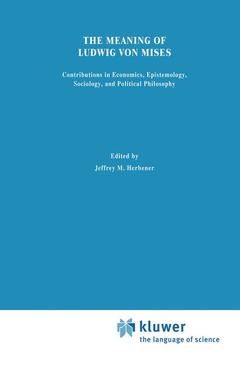Description
The Meaning of Ludwig von Mises, 1993
Contributions in Economics, Epistemology, Sociology, and Political Philosophy
Coordinator: Herbener Jeffrey M.
Language: English
Subjects for The Meaning of Ludwig von Mises:
Keywords
Publication date: 11-2013
350 p. · 15.5x23.5 cm · Paperback
350 p. · 15.5x23.5 cm · Paperback
Description
/li>Contents
/li>
Everyone carries a part of society on his shoulders; no one is relieved of his share of responsibility by others. And no one can find a safe way for himself if society is sweeping towards de struction. Therefore everyone, in his own interests, must thrust himself vigorously into the intellectual battle. No one can stand aside with unconcern: the interests of everyone hang on the result. Whether he chooses or not, every man is drawn into the great historical struggle, the decisive battle into which our 1 epoch has plunged us. his is the message of Ludwig von Mises. In the historical T battle of ideologies, Mises is a pivotal figure. With great courage and decisive effect he carried the banner of truth and freedom for others through a time of rising statism. Murray Rothbard is correct when he says, " . . . if the world is ever to get out of its miasma of statism, or, indeed, if the economics profession is ever to return to a sound and correct development of economic analysis, both will have to abandon their contemporary bog and move to that high ground that Mises developed for us. " 2 This collection of essays is both a restatement and extension of the major contributions of Mises in epistemology, history, econom ics, and political philosophy. Mises began constructing the high ground on the foundation provided by Carl Menger and Eugen von B6hm-Bawerk.
1. Praxeology, Positivism, and Public Choice: Was Mises a Public Choicer?.- 2. Economic Calculation Under Socialism: Ludwig von Mises and His Predecessors.- 3. Mises and His Methods.- 4. Ludwig von Mises and the Philosophy of History.- 5. On Praxeology and the Praxeological Foundations of Epistemology and Ethics.- 6. The Pure Time-Preference Theory of Interest: An Attempt at Clarification.- 7. Mises and the Role of the Economist in Public Policy.- 8. Ludwig von Mises as Social Rationalist.- 9. Who Predicted the 1929 Crash?.- 10. The Cultural Thought of Ludwig von Mises.- 11. Mises and His Critics on Ethics, Rights, and Law.
© 2024 LAVOISIER S.A.S.




